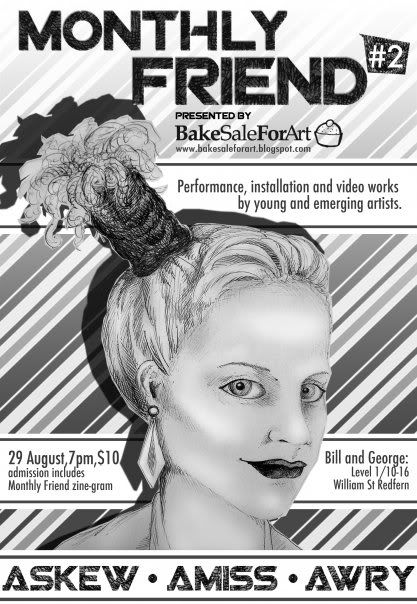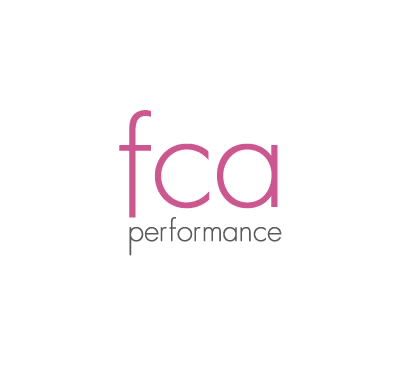AT LAST! The long awaited Crimp report arrives. Earlier in the year Simon and I were delighted to see that Martin Crimp, one of Britain’s most critically lauded and uncompromising playwrights, was programmed on not one, but three separate seasons; at UOW, STC and Griffin. “Hurrah”, we thought, a chance to see what Australian practitioners can do with such a formally intriguing writer. We did have our reservations however. What about the language? Is it too British? How does one approach Crimp? Naturalistically? He does write about the domestic unit a lot, but would that kill the poetry? Who are the people in Crimp’s work? Are they Characters? Should we treat them as such? Are we getting a little too worked up over all this?
The three productions that Simon and I saw over the past few months answered a few of these questions and quite often raised more. Sanja Simic’s
The Country, Benedict Andrews’
The City and Cristabel Sved’s
Dealing With Clair were all surprisingly similar interpretations of the same writer, with incremental differences in how various aspects were handled. Differences which Simon and I discuss below…….
S: The most impacting of the designs was undoubtedly Ralph Myers’ looming staircase for
The City. As soon as the lights came up, the sheer size of the stairs which almost completely filled the Wharf 2 stage space, pressed upon you, especially from my front row position.
M: Mirroring the audience obviously.
S: It also demanded a certain physical approach from the performers who had to negotiate the large steps.
M: Like Colin Moody galloping around the stairs or Belinda Mccory having to pace herself when ascending wearing a particularly inconvenient skirt.
S: The design allowed for some truly wonderful theatrical tricks, most notably the piano which appeared seemingly impossibly at the top of the stairs.
M: That was awesome. A trick obviously allowed by the EXTREME blackouts. Which also provided a space of disorientation for the audience between scenes. Couldn’t see your hand in front of your face.
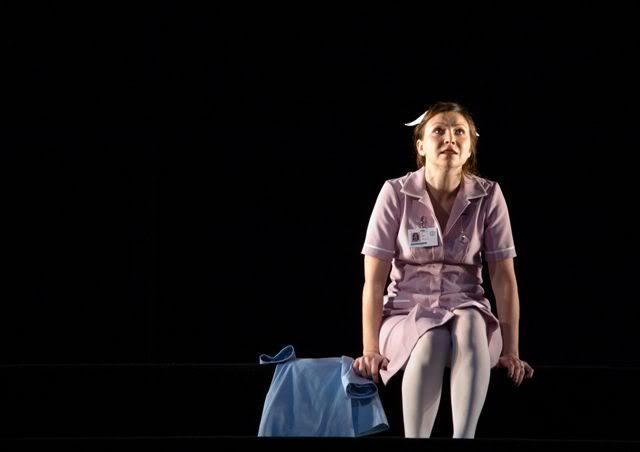
S: This I guess is where the problems began in terms of the impact of the text itself.
M: The text obviously works on various unsettling levels. First domestically estranged and uncomfortable then with increasingly bizarre images both in the language and in the doppelganger nature of the child figure.
S: However, because we were already unsettled by the design, the unsettling moments in the text had less of an impact.
M: Which is for me to do with a required level of naturalism in the work. You need a kind of base to work from. From where you can start to invade and fuck up the naturalistic world of the text.
S: On the opposite end of the spectrum you have
Dealing With Clair which strived for naturalism at the expense of Crimp’s unsettling moments.
M: And at the expense of good design and theatrical sense.
S: Ouch. I agree. The
Dealing With Clair set was stuck between trying for a beautiful theatrical image and trying for a realistic setting.
M: And so it basically ended up in no mans land. It was a little square carpet room
S: Filled with indicators of a family ready to move, such as cardboard boxes marked fragile, and lamps and laptops
M: And those black rope thingys
S: Cables?
M: Yeah was that it,/ Cables?
S: Maybe they were something to do with trains?
M: That’s a little obscure isn’t it? In any case they didn’t really do anything.
S: You certainly spent the entire play wondering if they were going to do something, but when they were finally engaged with, in what was meant to be a climactic emotional moment with Boris Brkic cutting them, it was just horrible.
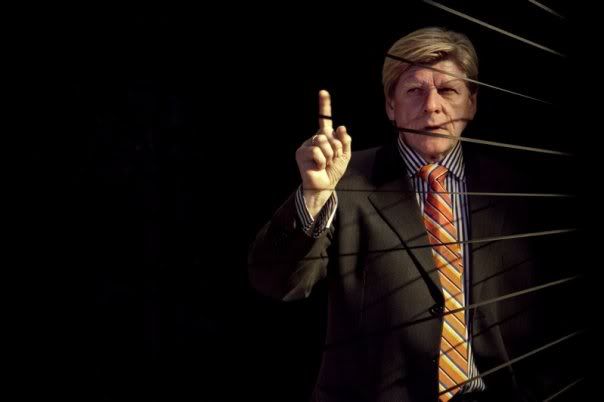
M: Yeah I think they made a real problem for themselves in boxing in the space like that, it meant that the transitions became stilted and awkward since there was just one entrance to the playing space. They were tripping over each other.
S: At first I was thinking surely that’s meant to be like that? That’s some sort of emotional world of the character right? The way they have to watch each other as they come and go. But no, it was really a matter of practicalities.
M: The metaphor got a bit swamped. So for me the level of naturalism in
Dealing With Clair was almost too much. It didn’t allow the text to breathe poetically really. And so instead of seeing through the real estate world to the heart of human greed we got a very bourgeois dinner story about property investment. It was totally banal.
S: Which was really disappointing, because even though this is an early Crimp, written before he was critically acclaimed playwright “Martin Crimp”, you could see the hints of his unique style emerging, and rather than relishing them, this production bulldozed through them.
M: I got the feeling of being yelled at.
S: Why were they so loud?
M: I don’t know. That was full on. It was a feeling I did not get from watching
The Country. Which I felt might have been closer to nailing the right level of naturalism in Crimp’s work. Obviously
The Country, in looking at a domestic landscape, is a little more realistic than the imaginative warzone/thoughtzone of
The City. But it struck me as finding the unsettling in less theatrical ways than Andrews’ production.
S: Well it was set on a traverse, with lighting bars shining at one end and a suspended tree emerging from a doorway at the other,
The Country was obviously not attempting to create a realistic set, but at the same time, nor did it completely remove any sense of realism as in
The City.M: They sat on chairs and talked to each other.
S: They were always obviously in the same room, a physical room, and the hints of realism such as the chair and the phone anchored this sense of place.
M: So it became more about the language games that the characters play on each other. The wife against the husband, the husband against the lover, the lover against the wife. About tactics. Which the performers (Natalie Randall, Theresa Mullan and Murray Clapham) handled beautifully.
S: The emphasis on character kept the stories grounded, so that the relationships were never lost in the language. You were never swept up into Crimp land like in
The City.
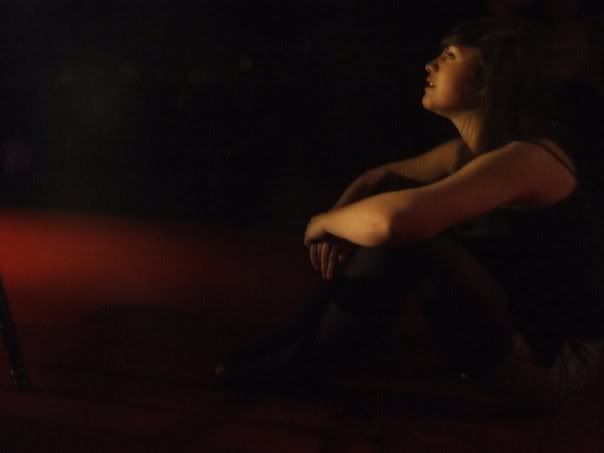
M:
The Country was my favourite text of the three.
S: Agreed.
M: Although I can see the danger in it falling into the
Dealing With Clair pothole, and just being more of a dinner story. In Sanja Simic’s production however this was nimbly avoided.
S: Imagine if it had been placed in naturalistic home, with pots and pans and babies’ booties lying about the place. One of Crimp’s greatest strengths I feel is the imaginative world he creates for his audience, and to rob his language of that power is to do a disservice to the text.
M: Vomit.
S: You can’t run away from the domesticity of Crimp’s work.
The City did this, and I think it definitely hindered the lasting impact of the work. The final scene failed to leave me with any lasting effect really; because I felt the same way I’d felt the entire time.
M: So you have to get the balance right. It can’t be too naturalistic because then you destroy the language and it becomes dull, but it can’t be too far into fantasy theatre land otherwise it stops being menacing and you miss what the texts are trying to say.
Despite
The City being the most accomplished and visually stunning of the three (I remember really liking it as I walked out) it sort of faded away over the next few days.
S: Now that raises an interesting question about which response is the most important, the initial reaction or the more contemplative week later thoughts.
M: I guess it depends on when we write the reviews.
S: (laughs) Ultimately,
The City was the most accomplished production, with fantastic performances
M: Colin Moody!
S: And sharp design, but it was almost as if Beno let his imagination run a little too far ahead of text, hampering its overall impact.
M: And
Dealing With Clair was a little misguided, seemingly lacking an awareness of how to deal with Crimp’s language, opting to plough through it at super pace and volume, instead of excavating the gaps in understanding and communication that make it an interesting work. Whereas
The Country managed to balance the unsettling with the domestic, demonstrating a more complete understanding of Crimp.
S: Allowing his distinctive style to have its full effect.
M: It’s interesting that these three works are the less formally stunning Crimp plays.
Attempts On Her Life or
Fewer Emergencies are for me far more intriguing works because of their disregard for character and conventional dramatic structure. I’d be more excited to see Beno do one of these, where I think his eye for image wouldn’t be quite so out of place.
S: It was certainly a different experience to watching
War Of The Roses, where his images often gave the actors the power from which to work. I felt that in this production, the actors held his images together. Which was perhaps the biggest problem with
Dealing With Clair. The decision to treat the text naturalistically had been made, but the acting simply didn’t match up to this decision.
M: Between the drunk acting and the game of snap I just wanted to kill them.
S: I couldn’t help but feel though that poor direction was the major problem though rather than any lack of skill on any individual actor’s behalf. Why hadn't they been instructed to actually play snap? Why had they been led to perform at a size large enough for the Opera House’s Drama Theatre, rather than at a more intimate level that a space like the Stables demands? There even seemed uneasiness in the bowing. I’m not sure if I imagined it because of my own experience of the play, but there seemed to be a lack of confidence in the work.
M: Yeah. We probably didn’t help by squirming throughout the play and half heartedly applauding. I feel a little bad actually since I’m sure they are not as unilaterally awful as that production made them seem. It really was just a few degrees off where it should have been. But after having seen
The City and
The Country, the difference just grated on me.
S: Hmmm
M: Yeah. Right. I think that’s it.
Your turn. The discussion can continue below…
